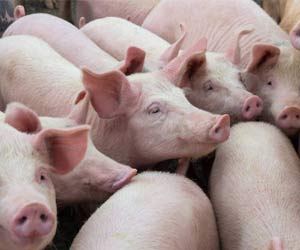Health officials in the Democratic Republic of Congo urgently want to find about 100 people believed to have been close to Ebola victims and contain an outbreak that may have taken
Health officials in the Democratic Republic of Congo urgently want to find about 100 people believed to have been close to Ebola victims and contain an outbreak that may have taken almost 170 lives, they said Friday.
"We are looking for all people who may have been in contact with the sick who are presenting symptoms of Ebola or of shigellosis," Secretary General Benoit Kebelo, a senior health ministry official, told AFP.The authorities want to stop an epidemic of Ebola, an incurable haemorrhagic fever that kills between 50 and 90 percent of those infected, depending on the strain and the speed of intervention to treat symptoms.
"We're looking for around 100 people, especially in the Kampungu zone," said Kebelo, referring to the epicentre of the epidemic, some 300 kilometres (185 miles) from the provincial capital of Kananga.
Officials fear that highly contagious Ebola, for which there is no known cure, may have claimed most of 169 lives out of 376 cases since April. However, some may be due to the simultaneous appearance of the Shigella strand of infectious dysentery, which is treatable by antibiotics.
Kebelo said that since the outbreaks were first detected at the end of April, five cases of Ebola and one of Shigella had been formally confirmed by international laboratories.
But for the broader picture, "you must approach these numbers with caution," warned Kebelo, who heads a joint ministerial task force coordinating with the UN World Health Organisation (WHO), the US Centers for Disease Control, and a team from Doctors Without Borders (MSF).
Advertisement
The main aim of the government was to prevent an epidemic like that of 1976, when almost 500 people died in what was then Zaire and a neighbouring part of Sudan.
Advertisement
The health ministry has deployed "about 100" doctors, nurses, logistics staff and educators in the danger zone, but these teams need bicycles to get around the region, the coordinator added.
Belgian MSF teams in the area have been reinforced since late August after confirmation of the first new Ebola case in the country where the disease was first identified in 1976. The WHO has also sent a delegation from Geneva, with medical supplies and protective clothing for health staff.
"We've set up a quarantine unit in a shed near the Kampungu health centre," MSF-Belgium coordinator in DRC, Sylvaine Lonlas, told AFP. "On Thursday night, we had three patients in serious condition and total isolation, and two under moderate surveillance. Six others are convalescing and come back every day for a check-up."
Ebola's survival rate can be increased by quarantine and swift help for those infected, who risk high fever, rapid dehydration, internal haemorrhage and blood loss.
The Atlanta-based CDC -- which identified one of the first Ebola cases -- is expected shortly to send an epidemiologist and set up an on-site laboratory for a more precise diagnosis of cases, several medical sources told AFP.
The government of Angola, whose northern and northeastern provinces border on Kasai Occidentale, placed health authorities in these regions on high alert for Ebola on Friday in response to the DRC outbreak.
After it reappeared in Sudan in 1979, Ebola, which was named after a river in the Equateur province where it was first identified in 1976, suddenly swept Zaire again in 1995, claiming 245 lives out of the 315 registered cases.
Source-AFP
SRM






